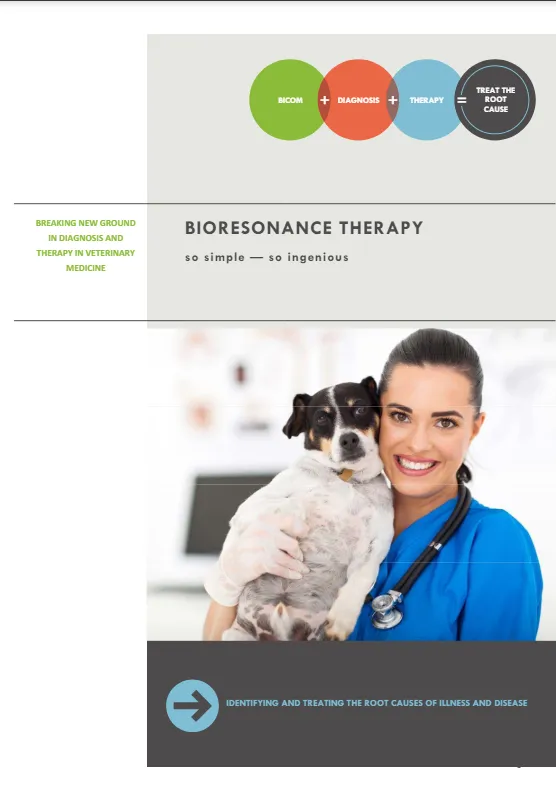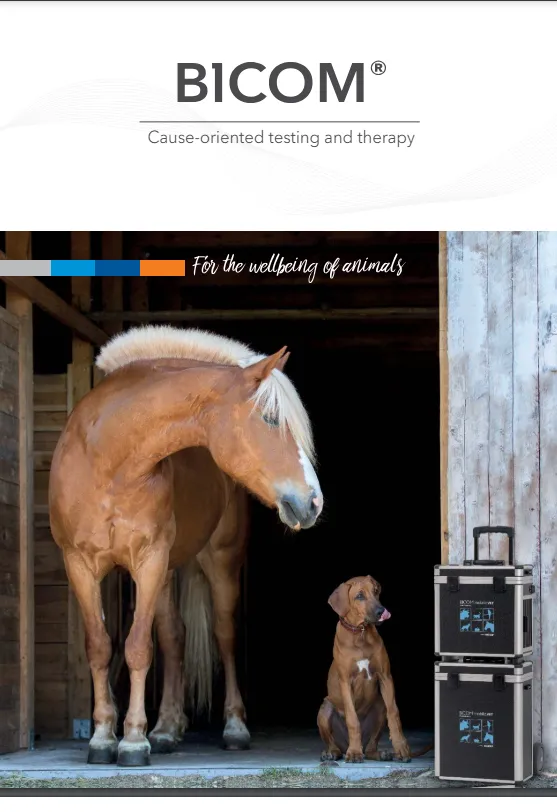BICOM® Bioresonance
Stress-free for pets and pet owners Suitable for all types of animals
There are many dogs , cats and horses suffering from health problems worldwide.
Be it problems with the musculoskeletal system, allergies and food intolerances or chronic diseases.
Sometimes, as an animal owner, you are at a loss when you can’t get any further with conventional therapy methods.
Like acupuncture or homeopathy, bioresonance belongs to the field of complementary medicine and is intended to be a useful supplement to conventional medicine.
It works with the body’s own wavelength of the four-legged friend, is used without medication and is painless to use.
Of course, not all health problems can be resolved with bioresonance. It is best to talk to a veterinarian or animal naturopath.
With our therapist finder you can find the nearest practice that can offer you BICOM® bioresonance.
Pain-free testing and therapy
Treatment with the BICOM® device is painless and stress-free. Especially sensitive animals feel very comfortable and it often happens that they completely relax and come to rest during the therapy.
Bioresonance has no harmful side effects and is used without medication.
Occasionally, initial aggravations, in what is known as the body’s initial reaction, can occur. However, these fade away after a short time.
What Pet Owners are saying..

Top 10 Essential Questions to Ask Your Cat Vet for Best Care
10 Essential Questions to Ask Your Cat Vet During the First Visit
When bringing a new cat into your home, one of the most important steps is scheduling a visit to the cat vet. The first visit is crucial for establishing a healthy relationship between your cat and their vet, ensuring that your furry friend receives the best care from the start. To make the most of this initial appointment, it's essential to ask the right questions. Here are the 10 essential questions to ask your cat vet during the first visit to ensure your cat stays healthy and happy.
1. What Vaccinations Does My Cat Need?
Vaccinations are a critical part of your cat’s health care routine. During your first visit, ask your cat vet about the necessary vaccinations for your feline friend. Cats typically need vaccines against common diseases such as feline distemper, feline herpesvirus, and rabies. Your cat vet can provide a vaccination schedule tailored to your cat’s age, health status, and lifestyle. Understanding which vaccinations are essential will help protect your cat from potentially life-threatening diseases.
2. How Often Should I Bring My Cat to the Vet?
Routine check-ups are vital for maintaining your cat's health. Ask the cat vet how often you should schedule visits for your pet. Typically, vets for pets recommend annual check-ups, but this can vary depending on your cat's age, breed, and health status. For instance, kittens and senior cats may require more frequent visits. Your cat vet will provide guidance on the best schedule to keep your cat in optimal health.
3. What Type of Diet is Best for My Cat?
Diet plays a significant role in your cat's overall well-being. During your visit, ask the cat vet about the best diet for your cat’s specific needs. Cats have unique dietary requirements that differ from other pets. They are obligate carnivores, meaning their diet should be high in protein and low in carbohydrates. Your vet can recommend high-quality cat food that meets these nutritional needs and suggest portion sizes to avoid obesity. They can also advise on whether your cat needs any supplements based on its health and lifestyle.
4. What Signs of Illness Should I Watch For?
Cats are masters at hiding their discomfort. It’s important to ask your cat vet what signs of illness to watch for. Some common signs include changes in appetite, behavior, grooming habits, and litter box use. Knowing what to look for can help you detect potential health issues early, allowing for prompt treatment. Your cat vet can provide a comprehensive list of symptoms that may indicate health problems, ensuring you’re well-prepared to monitor your pet’s health at home.
5. How Can I Keep My Cat’s Teeth Healthy?
Dental health is often overlooked but is vital to your cat’s overall health. Ask the cat vet about the best ways to maintain your cat’s dental hygiene. Cats can suffer from dental diseases, which can lead to more serious health problems if left untreated. Your vet may recommend regular teeth brushing, dental treats, or professional cleanings. Understanding how to care for your cat’s teeth will help prevent dental issues and keep your pet healthy.
6. What Parasite Prevention Does My Cat Need?
Parasites such as fleas, ticks, and worms can pose serious health risks to cats. During your first visit, ask the cat vet about the necessary parasite prevention measures. Vets for pets often recommend a combination of treatments to protect against both internal and external parasites. Your vet can suggest the best products and provide guidance on how frequently they should be administered. Keeping your cat protected from parasites is essential for their health and comfort.
7. Is My Cat at a Healthy Weight?
Weight management is crucial for your cat’s health. Ask the cat vet if your cat is at a healthy weight. Obesity is a common issue in cats and can lead to serious health problems such as diabetes and joint issues. Your vet will assess your cat’s body condition and provide guidance on maintaining a healthy weight through diet and exercise. Vets for pets can offer specific recommendations tailored to your cat’s needs to ensure they stay fit and healthy.
8. Should I Spay or Neuter My Cat?
Spaying or neutering your cat is an important decision that can have long-term health benefits. During your visit, discuss with the cat vet the pros and cons of spaying or neutering. The procedure can prevent certain cancers and reduce the risk of behavioral problems. Your vet can provide information on the best time to perform the surgery and explain the potential risks and benefits. Making an informed decision about spaying or neutering will contribute to your cat’s overall well-being.
9. What Should I Do If My Cat Has Behavioral Issues?
Behavioral issues such as aggression, litter box problems, or excessive meowing can be concerning for cat owners. Ask the cat vet for advice on managing these behaviors. They can help determine whether the behavior is due to a medical issue or if it’s purely behavioral. Vets for pets often have experience in managing feline behavior and can provide tips or refer you to a specialist if needed. Understanding how to address behavioral problems can lead to a happier, more harmonious home environment.
10. How Can I Make Vet Visits Less Stressful for My Cat?
Vet visits can be stressful for cats, but there are ways to make the experience more comfortable. Ask the cat vet for tips on reducing stress during visits. They might suggest using a carrier that your cat is comfortable with, bringing familiar items such as a blanket or toy, or using calming pheromones. Vets for pets understand that a calm cat is easier to examine and treat, so they will have strategies to help make the experience as stress-free as possible.
Conclusion
Your cat’s first visit to the vet is a crucial opportunity to establish a foundation for their lifelong health care. By asking these 10 essential questions, you can ensure you’re taking the necessary steps to provide the best care for your feline friend. Always remember that regular communication with your cat vet and routine check-ups are key to maintaining your pet’s health. Vets for pets are there to help guide you in providing a happy, healthy life for your cat. Make sure to follow their advice and stay informed about your cat’s health needs. With the right care and attention, your cat will enjoy a long, healthy, and happy life.
To find a vet near you please complete the form below
Quick Links








Facebook
Instagram
Mail